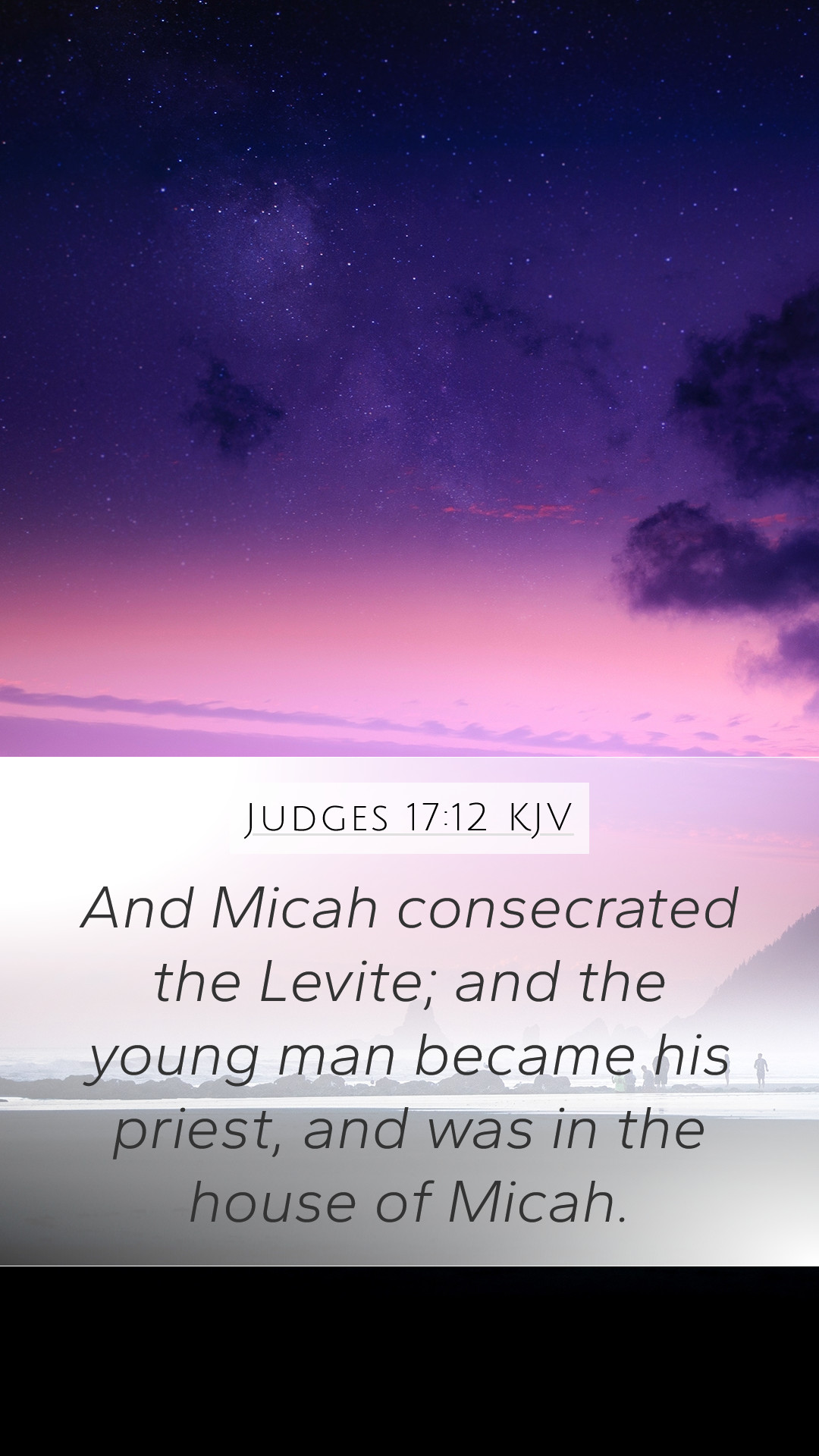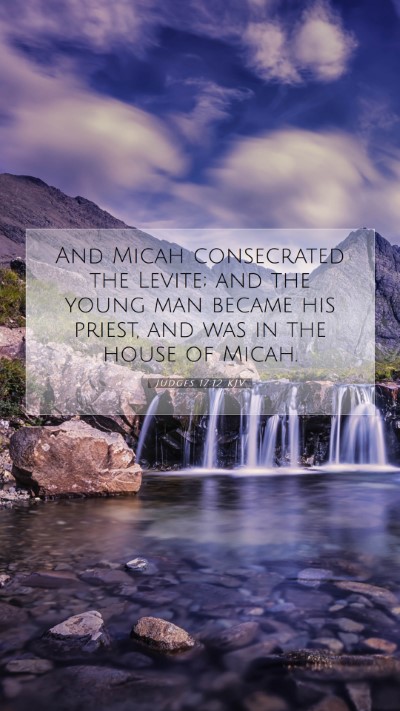Old Testament
Genesis Exodus Leviticus Numbers Deuteronomy Joshua Judges Ruth 1 Samuel 2 Samuel 1 Kings 2 Kings 1 Chronicles 2 Chronicles Ezra Nehemiah Esther Job Psalms Proverbs Ecclesiastes Song of Solomon Isaiah Jeremiah Lamentations Ezekiel Daniel Hosea Joel Amos Obadiah Jonah Micah Nahum Habakkuk Zephaniah Haggai Zechariah MalachiJudges 17:12 Meaning
What is the meaning of Judges 17:12?
And Micah consecrated the Levite; and the young man became his priest, and was in the house of Micah.
Judges 17:12 Bible Verse Meaning
Bible Verse Meaning: Judges 17:12
Judges 17:12 states:
“And Micah consecrated the Levite; and the young man became his priest, and was in the house of Micah.”
Overview of Judges 17:12
This verse describes an incident involving Micah, a man in the hill country of Ephraim, who creates a personal shrine and appoints a Levite to serve as his priest. The Levite, being a descendant of the tribe of Levi, holds a special role in Israel’s religious life, which adds complexity to Micah's actions.
Bible Verse Interpretations
Various public domain commentaries provide insights into the meaning and implications of this verse, focusing on several key themes:
-
Religious Syncretism:
Micah’s actions reflect a troubling trend in Israel’s history where individual worship practices proliferate outside the established worship in Shiloh. Matthew Henry points out that this indicates a departure from God’s ordained worship, leading to confusion and disobedience among the Israelites.
-
Role of the Levite:
Albert Barnes emphasizes the Levite’s role as a priest for hire, which was likely a deviation from the divinely appointed system. This scenario demonstrates the compromised state of worship in Israel during the time of the Judges, where religious roles were sometimes determined by personal convenience rather than divine ordination.
-
Consecration of the Levite:
Adam Clarke notes that Micah's consecration of the Levite illustrates the misguided notion that true worship can arise from personal desire rather than from adherence to God’s commands. The Levite’s willingness to accept this role could indicate a troubling flexibility in his own understanding of his duties as prescribed by the Law.
-
Impact of Individualism:
This verse serves as a caution against the dangers of individualism in faith practices. It invites readers to reflect on the communal aspects of worship intended by God, contrasting Micah’s individualistic approach with the larger community of Israel called to follow God’s laws together.
Understanding the Historical Context
The context of Judges is crucial for understanding the implications of this verse. During this period, Israel lacked a centralized authority following Joshua’s death. As a result, tribes and individuals tended to forge their own paths concerning worship and governance.
This setting sheds light on the significance of Micah's actions, as he operates in a religious vacuum. Without prophetic leadership or a king, individuals like Micah became their own religious authorities, often leading to corruption and deviation from God's intended order.
Bible Study Insights
This verse presents several lessons for modern readers engaged in Bible study:
-
Importance of Boundaries in Worship:
In engaging with Scripture, believers are encouraged to understand and adhere to the principles set forth in the Bible concerning worship. Judges 17:12 warns against establishing personal worship practices that contradict biblical guidelines.
-
Accountability in Leadership:
This narrative urges contemporary readers to evaluate the standards and motivations of those in positions of spiritual leadership. Congregations ought to seek leaders who remain committed to the truth of Scripture rather than those who cater to personal or popular whims.
-
Consequences of Fragmented Faith:
Micah's fragmentation of worship practices serves as a stark reminder that a lack of centralized guidance can lead to disorder and individual deviations from God's will. Believers today can reflect on how the unity in faith is vital for spiritual health.
Application of Judges 17:12
This verse can be applied to the modern believer's life in several ways, emphasizing the importance of Scripture in guiding personal and communal worship practices:
-
Discernment in Worship:
Before adopting new practices or teachings, individuals should weigh them against biblical truths, ensuring they align with God's Word.
-
Community Engagement:
Encouraging engagement in Bible study groups or church communities embodies the unity and collective accountability that God desires from His people.
-
Respecting Sacred Roles:
Recognizing the importance of those called to serve within the church, while verifying that they uphold biblical standards of leadership and doctrine.
Cross References
Several other verses provide additional context and surprising connections to Judges 17:12:
- Exodus 28:1: Discusses the appointment of priests from the tribe of Levi, highlighting the divine order of worship.
- Deuteronomy 12:5-7: Outlines God's command for worship to occur at specific places, contrary to Micah's private shrine.
- 1 Samuel 2:12: Mentions the corruption of the priesthood, reflecting the spiritual decay seen in Micah's actions.
Conclusion
Judges 17:12 serves as a vivid illustration of the pitfalls of religious individualism and the need for adherence to divinely established worship. By exploring this verse through the lenses of traditional commentaries and modern applications, one gains deeper insights into its significance, leaving an enduring message for Bible study insights, leading toward a richer understanding of Scripture.


